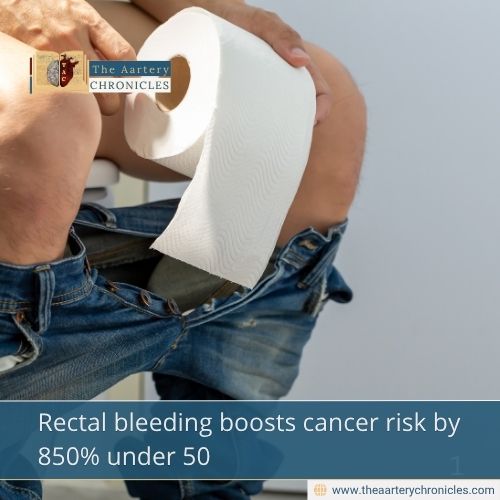

Rectal bleeding boosts cancer risk by 850% under 50
Rectal bleeding has now been identified as the strongest red flag for colorectal cancer in adults under 50, according to new research from the University of Louisville Health. The study revealed that younger adults with rectal bleeding were 8.5 times more likely to be diagnosed with colorectal cancer compared to those without this symptom.
What makes this finding even more concerning is that nearly 70% of young patients diagnosed had no family history of the disease. This suggests that relying only on genetics and family history may leave many at-risk individuals undetected.
Key insights from the study
The research, which reviewed medical records of 443 patients under the age of 50 who underwent colonoscopies between 2021 and 2023, uncovered several striking observations:
- Rectal bleeding as a predictor: Almost half of the patients who presented with rectal bleeding were later diagnosed with early-onset colorectal cancer.
- Symptom-driven testing matters: About 88% of patients who turned out to have colorectal cancer had undergone colonoscopy because of symptoms like bleeding. In contrast, only 55% of those without cancer had a symptom-driven colonoscopy.
- Genetics play a limited role: Only 13% of cancer cases were linked to inherited genetic syndromes. Having a family history increased the risk just two-fold, compared to the 8.5-fold risk increase seen with rectal bleeding.
- Lifestyle impact: Former smokers were found to have nearly double the odds of developing early-onset colorectal cancer.
Screening gaps and why this matters
Currently, U.S. guidelines recommend routine colorectal cancer screening starting at age 45 for average-risk adults. However, this study highlights a critical gap: many younger patients fall below the screening age but may already show warning symptoms.
Dr Sandra Kavalukas, a colorectal surgeon and senior author of the study, emphasised, “If a 35-year-old comes in with rectal pain, a colonoscopy may not be needed. But if that same patient reports rectal bleeding, their likelihood of colorectal cancer is dramatically higher.”
What this means for patients and doctors
The findings underline the importance of not ignoring rectal bleeding in younger adults. While haemorrhoids and other benign conditions can also cause bleeding, this symptom should never be dismissed, especially when it persists. Doctors may need to consider early colonoscopy in such cases, even if the patient is below the standard screening age.
Conclusion
This study sends a clear message: rectal bleeding linked to colorectal cancer in adults under 50 must be taken seriously. Since many young patients do not have a family history or genetic markers, early recognition of symptoms could be life-saving. Paying attention to rectal bleeding and acting quickly with diagnostic tests like colonoscopy could help bridge the current screening gap and improve outcomes for younger patients.
Source: Inputs from various media Sources
I’m a pharmacist with a strong background in health sciences. I hold a BSc from Delhi University and a pharmacy degree from PDM University. I write articles and daily health news while interviewing doctors to bring you the latest insights. In my free time, you’ll find me at the gym or lost in a sci-fi novel.
- Priya Bairagi
- Health News and Updates,People Forum
- 5 October 2025
- 13:00








